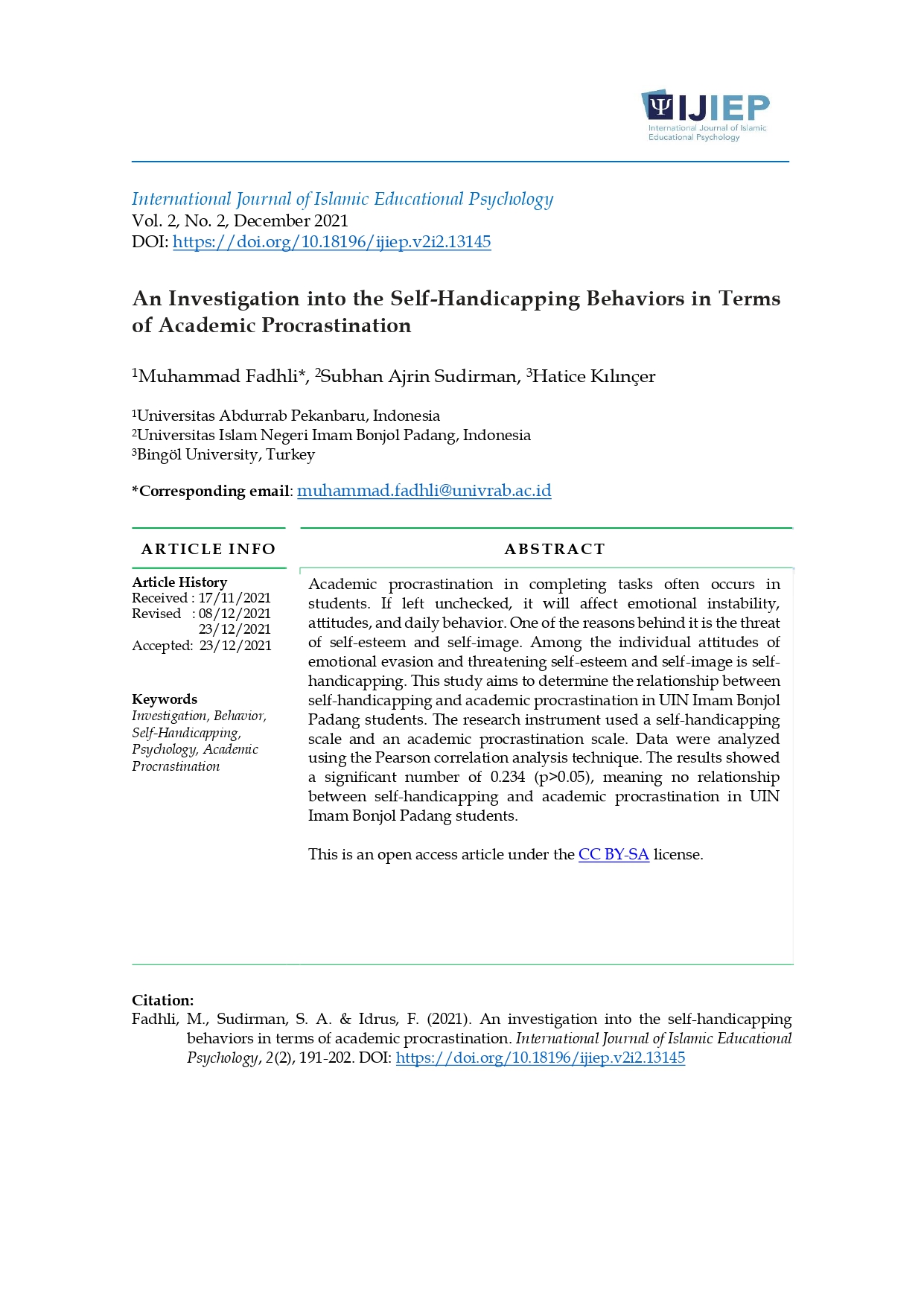An Investigation into the Self-Handicapping Behaviors in Terms of Academic Procrastination
DOI:
https://doi.org/10.18196/ijiep.v2i2.13145Keywords:
Investigation, Behavior, Self-Handicapping, Psychology, Academic ProcrastinationAbstract
Academic procrastination in completing tasks often occurs in students. If left unchecked, it will affect emotional instability, attitudes, and daily behavior. One of the reasons behind it is the threat of self-esteem and self-image. Among the individual attitudes of emotional evasion and threatening self-esteem and self-image is self-handicapping. This study aims to determine the relationship between self-handicapping and academic procrastination in UIN Imam Bonjol Padang students. The research instrument used a self-handicapping scale and an academic procrastination scale. Data were analyzed using the Pearson correlation analysis technique. The results showed a significant number of 0.234 (p>0.05), meaning no relationship between self-handicapping and academic procrastination in UIN Imam Bonjol Padang students.
References
Afzal, S., & Jami, H. (2018). Prevalence of academic procrastination and reasons for academic procrastination in University Students. Journal of Behavioural Sciences, 28(1), 51-69.
Arikunto, S. (2006). Prosedur penelitian; Suatu pendekatan praktik. Jakarta: Bumi Aksara.
Balkis, M. (2013). Academic procrastination, academic life satisfaction and academic achievement: The mediation role of rational beliefs about studying. Journal of Cognitive and Behavioral Psychotherapies, 13(1), 57-74.
Barutçu Yıldırım, F., & Demir, A. (2020). Self-handicapping among university students: The role of procrastination, test anxiety, self-esteem, and self-compassion. Psychological Reports, 123(3), 825–843. https://doi.org/10.1177/0033294118825099
Berglas, S., & Jones, E. E. (1978). Drug choice as a self-handicapping strategy in response to noncontingent success. Journal of Personality and Social Psychology, 36(4), 405–417. https://doi.org/10.1037/0022-3514.36.4.405
Uzun, B., LeBlanc, S., & Ferrari, J. R. (2020). Relationship between Academic Procrastination and Self-Control: The Mediational Role of Self-Esteem. College Student Journal, 54(3), 309-316.
Karami, A., Khodarahimi, S., Ghazanfari, F., Mirdrikvand, F., & Barigh, M. (2020). The prediction of distress tolerance based on the feeling of loneliness and self-handicapping in students. Personality and Individual Differences, 161. https://doi.org/10.1016/j.paid.2020.109994
Kathleen, E., & Basaria, D. (2021). The relationship between perfectionism and academic procrastination in college students learning online due to the covid-19 pandemic. In International Conference on Economics, Business, Social, and Humanities (ICEBSH 2021). https://doi.org/10.2991/assehr.k.210805.188
Khaidir, E., & Suud, F. M. (2020). Islamic education in forming students' characters at as-shofa Islamic High School, Pekanbaru Riau. International Journal of Islamic Educational Psychology, 1(1), 50-63. https://doi.org/10.18196/ijiep.1105
Kınık, Ö., & Odacı, H. (2020). Effects of dysfunctional attitudes and depression on academic procrastination: does self-esteem have a mediating role?. British Journal of Guidance & Counselling, 48(5), 638-649. https://doi.org/10.1080/03069885.2020.1780564
Korstange, R., Craig, M., & Duncan, M. D. (2019). Understanding and addressing student procrastination in college. Learning Assistance Review, 24(1), 57-70.
Kong, C. L. A. (2020). Academic motivation as a mediator between contingent self-esteem and self-handicapping: A sample of Hong Kong university students. (Outstanding Academic Papers by Students (OAPS), City University of Hong Kong).
Küchler, A.-M., Albus, P., Ebert, D. D., & Baumeister, H. (2019). Effectiveness of an internet-based intervention for procrastination in college students (StudiCare Procrastination): Study protocol of a randomized controlled trial. Internet Interventions, 17(1). https://doi.org/10.1016/j.invent.2019.100245
Martin, J. R. (2018). School was our life: remembering progressive education. Indiana. USA: Indiana University Press.
Park, S. W., & Brown, C. M. (2014). Different perceptions of self-handicapping across college and work contexts. Journal of Applied Social Psychology, 44(2), 124-132. https://doi.org/10.1111/jasp.12204
Pavot, W. (2007). The assessment of subjective well-being. New York: The Guilford Press.
Rouzi, K. S., Afifah, N., Hendrianto, C., & Desmita, D. (2020). Establishing an islamic learning habituation through the prophets’ parenting styles in the new normal era. International Journal of Islamic Educational Psychology, 1(2), 101-111. https://doi.org/10.18196/ijiep.v1i2.9638
Sarirah, T., & Chaq, S. A. (2019). Academic self-efficacy as a predictor toward decisional procrastination among college students preparing a thesis in Indonesia. Journal of Advanced Research in Social Sciences and Humanities, 4(1), 23-28. https://dx.doi.org/10.26500/JARSSH-04-2019-0104
Scent, C. L., & Boes, S. R. (2014). Acceptance and commitment training: A brief intervention to reduce procrastination among college students. Journal of College Student Psychotherapy, 28(2), 144-156. https://doi.org/10.1080/87568225.2014.883887
Schmidt, H. G., Baars, G. J., Hermus, P., Molen, H. T., Arnold, I. J., & Smeets, G. (2021). Changes in examination practices reduce procrastination in university students. European Journal of Higher Education, 1-16. https://doi.org/10.1080/21568235.2021.1875857
Schwinger, M., & Stiensmeier-Pelster, J. (2011). Prevention of self-handicapping — The protective function of mastery goals. Learning and Individual Differences, 21(6), 699-709. https://doi.org/10.1016/j.lindif.2011.09.004
Schwinger, M., Trautner, M., Pütz, N., Fabianek, S., Lemmer, G., Lauermann, F., & Wirthwein, L. (2021). Why do students use strategies that hurt their chances of academic success? A meta-analysis of antecedents of academic self-handicapping. Journal of Educational Psychology, 1-21. https://doi.org/10.1037/edu0000706
Solomon, L. J., & Rothblum, E. D. (1984). Academic procrastination: Frequency and cognitive-behavioral correlates. Journal of Counseling Psychology, 31(4), 503–509. http://dx.doi.org/10.1037/0022-0167.31.4.503
Sugiyono, S. (2013). Metode penelitian pendidikan pendekatan kuantitatif, kualitatif, dan R&D. Bandung: Alfabeta.
Willetts, D. (2017). A university education. New York: Oxford University Press.
Zakeri, H., Esfahani, B. N., & Razmjoee, M. (2013). Parenting styles and academic procrastination. Social and Behavioral Sciences, 84, 57-60. https://doi.org/10.1016/j.sbspro.2013.06.509

Downloads
Published
How to Cite
Issue
Section
License

- Share — copy and redistribute the material in any medium or format
- Adapt—remix, transform, and build upon the material for any purpose, even commercially.
The licensor cannot revoke these freedoms as long as you follow the license terms. Under the following terms:
- Attribution: You must give appropriate credit, provide a link to the license, and indicate if changes were made. You may do so in any reasonable manner, but not in any way that suggests the licensor endorses you or your use.
- ShareAlike: If you remix, transform, or build upon the material, you must distribute your contributions under the same license as the original.
- No additional restrictions — You may not apply legal terms or technological measures that legally restrict others from doing anything the license permits.






